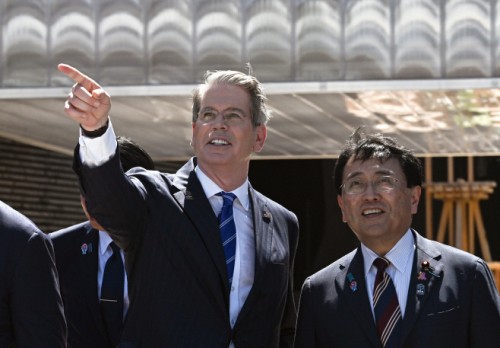 |
| U.S. Treasury Secretary Scott Vesent (left) and Japan’s Minister for Economic Revitalization Ryosei Akazawa pose for a commemorative photo in front of the U.S. pavilion after attending "USA Day" at the World Expo in Osaka, Japan, on July 19. / Source: EPA-Yonhap News |
U.S. Treasury Secretary Scott Vesent indicated on July 21 that the Trump administration’s August 1 deadline to impose high reciprocal tariffs is not a hard cutoff, but rather a tactic to pressure trade partners into reaching favorable deals.
In an interview with CNBC, Vesent said that while President Donald Trump’s position would ultimately guide the decision, he believed the return to the tariff levels announced on April 2 would increase pressure on other countries. “If we go back to those higher tariffs, I think that will push countries to make better deals,” he said.
This suggests that the U.S. may proceed with the planned tariffs on August 1 while continuing trade negotiations afterward.
CNBC reported that investors and importers are unsure whether the tariffs will be implemented next month or if the deadline will be extended again. On April 2, President Trump announced reciprocal tariff rates on 57 economic entities, including 56 countries and the European Union.
Vesent emphasized, “We’re not rushing to a deal. What matters is the quality of the agreement, not the timing.” He added, “President Trump has created maximum leverage, and we are more focused on reaching high-quality agreements than on simply meeting the August 1 deadline.”
He continued, “We can keep talking, but we won’t rush into a deal just to have one.”
Citing recent trade deals with the U.K., Vietnam, and most recently Indonesia, Vesent described the latter as a successful case of persistent negotiation. “Indonesia came to us five times with draft proposals,” he said. “The first was good, but we kept asking for more. Each one got better, and we ended up with a fantastic agreement.”
The U.S. eventually set Indonesia’s reciprocal tariff rate at 19%, a notable drop from the 32% proposed in April.
While acknowledging internal frustration over slow talks with the EU, Vesent noted that Brussels is now showing more willingness to engage with Washington than before.
As the lead U.S. negotiator for China trade talks, Vesent said a new round of U.S.-China dialogue is imminent and may cover additional issues, including China’s purchases of oil from sanctioned nations. “Unfortunately, China continues to buy large volumes of oil from Iran and Russia,” he said. “That will likely come up in our next negotiations.”
He warned that countries buying Russian oil—targeted by U.S. sanctions—would face secondary tariffs of up to 100%.
President Trump previously stated on July 14 that if Russia fails to agree to a ceasefire in Ukraine within 50 days, the U.S. would consider imposing 100% tariffs on countries continuing trade with Russia.
Vesent also hinted at increased scrutiny of the Federal Reserve, following Trump’s criticism of the Fed’s reluctance to cut interest rates and its allegedly excessive spending on building renovations.
Most Read
-
1
-
2
-
3
-
4
-
5
-
6
-
7





















